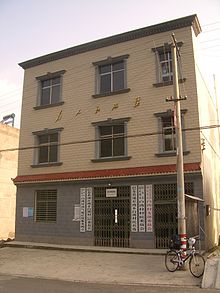Organic Law of Village Committees
- Organic Law of Village Committees
-

The building housing the local village committee and other organizations in Baisha Village, Xiqiuwan Township,
Badong County,
Hubei
The Organic Law of Village Committees (中华人民共和国村民委员会组织法; Pinyin:Zhōnghuá Rénmín Gònghéguó cūnmín wěiyuánhuì zǔzhīfǎ) consists of 30 articles about self-governance, self-education and elections in Chinese villages.
The Organic Law of Village Committees sets the rules and regulations under which the Chinese villagers may govern their villages as well as terms and conditions for village elections.
After a trial implementation in 1987 the Organic Law of Village Committees was fully adopted in 1998 by the National People’s Congress of China.
References
See also
Wikimedia Foundation.
2010.
Look at other dictionaries:
Law enforcement in the People's Republic of China — consists of an extensive public security system and a variety of enforcement procedures are used to maintain order in the country. Along with the courts and procuratorates, the country s judicial and public security agencies included the Ministry … Wikipedia
Villages of the People's Republic of China — formally Village level divisions Simplified Chinese 村级行政区 Traditional Chinese 村級行政區 … Wikipedia
democracy and elections — Elections (xuanxing) and, to a much lesser extent, democracy (minzhu zhuyi) were elements of Chinese political discourse long before the first outpouring of democratic dissent in the late 1970s. Many of the political debates of late nineteenth… … Encyclopedia of Contemporary Chinese Culture
china — /chuy neuh/, n. 1. a translucent ceramic material, biscuit fired at a high temperature, its glaze fired at a low temperature. 2. any porcelain ware. 3. plates, cups, saucers, etc., collectively. 4. figurines made of porcelain or ceramic material … Universalium
China — /chuy neuh/, n. 1. People s Republic of, a country in E Asia. 1,221,591,778; 3,691,502 sq. mi. (9,560,990 sq. km). Cap.: Beijing. 2. Republic of. Also called Nationalist China. a republic consisting mainly of the island of Taiwan off the SE coast … Universalium
Spain — /spayn/, n. a kingdom in SW Europe. Including the Balearic and Canary islands, 39,244,195; 194,988 sq. mi. (505,019 sq. km). Cap.: Madrid. Spanish, España. * * * Spain Introduction Spain Background: Spain s powerful world empire of the 16th and… … Universalium
History of agriculture in the People's Republic of China — For over 4,000 years, China has been a nation of farmers. By the time the People s Republic of China was established in 1949, virtually all arable land was under cultivation; irrigation and drainage systems constructed centuries earlier and… … Wikipedia
japan — japanner, n. /jeuh pan /, n., adj., v., japanned, japanning. n. 1. any of various hard, durable, black varnishes, originally from Japan, for coating wood, metal, or other surfaces. 2. work varnished and figured in the Japanese manner. 3. Japans,… … Universalium
Japan — /jeuh pan /, n. 1. a constitutional monarchy on a chain of islands off the E coast of Asia: main islands, Hokkaido, Honshu, Kyushu, and Shikoku. 125,716,637; 141,529 sq. mi. (366,560 sq. km). Cap.: Tokyo. Japanese, Nihon, Nippon. 2. Sea of, the… … Universalium
Elections in the People's Republic of China — take two forms. Direct elections occur for village councils in designated rural areas, and for the local People s Congress in all areas. All other levels of the People s Congress up to the National People s Congress, the national legislature, are … Wikipedia
 The building housing the local village committee and other organizations in Baisha Village, Xiqiuwan Township, Badong County, Hubei
The building housing the local village committee and other organizations in Baisha Village, Xiqiuwan Township, Badong County, Hubei
